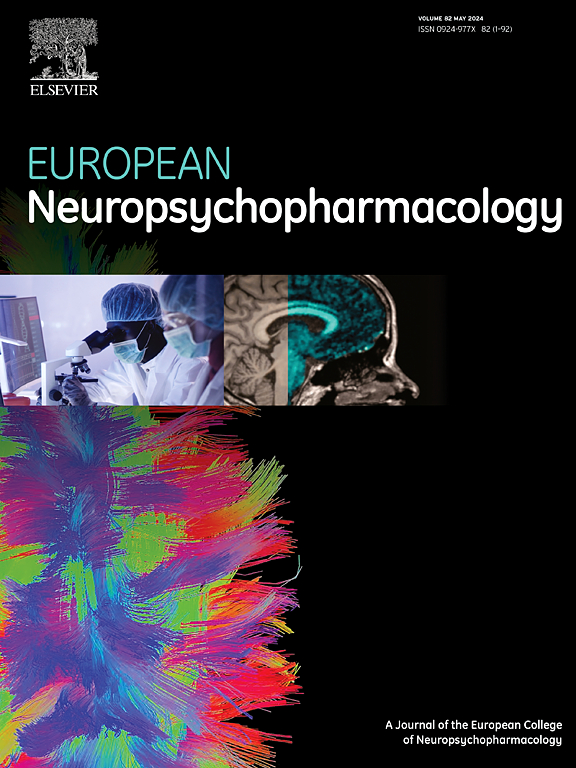Interrelationships between polygenic risk scores, cognition, symptoms, and functioning in first-episode psychosis: A network analysis approach
IF 6.1
2区 医学
Q1 CLINICAL NEUROLOGY
引用次数: 0
Abstract
Psychopathological manifestations and cognitive impairments are core features of psychotic disorders. Polygenic risk scores (PRS) offer insights into the relationships between genetic vulnerability, symptomatology, and cognitive impairments. This study used a network analysis to explore the connections between PRS, cognition, psychopathology, and overall functional outcomes in individuals experiencing a first episode of psychosis (FEP). The study sample comprised 132 patients with FEP. Genetic data were used to construct PRS for mental disorders and cognitive traits via PRS-continuous shrinkage. We conducted comprehensive clinical and neuropsychological assessments at 2 months post-diagnosis and again at a 2-year follow-up. A network analysis was performed to generate two distinct networks and their centrality indices, encompassing 19 variables across domains such as symptoms, cognition, functioning, and PRS. Variables were grouped within related domains, and stronger relationships were observed within domains than between them. PRS for schizophrenia showed weak negative associations with attention, working memory, and verbal memory, while PRS for cognitive performance showed weak positive associations with attention. Negative symptoms were negatively associated with functioning and verbal memory at both the 2-month and 2-year assessments, as well as with social cognition at 2 years. Poor functioning was moderately related to greater severity of Positive and Negative Syndrome Scale dimensions. This study identified pathways linking PRS, cognition, symptoms, and functioning, suggesting that genetic risk may serve as a marker of vulnerability and disorder progression. The findings also highlight the importance of considering genetic predispositions alongside clinical and cognitive factors to better understand the heterogeneity of psychotic disorders.
多基因风险评分、认知、症状和首发精神病功能之间的相互关系:网络分析方法
精神病理表现和认知障碍是精神障碍的核心特征。多基因风险评分(PRS)提供了遗传易感性、症状学和认知障碍之间关系的见解。本研究使用网络分析来探讨首发精神病(FEP)个体的PRS、认知、精神病理和整体功能结局之间的联系。研究样本包括132例FEP患者。利用遗传数据构建心理障碍和认知特征的连续收缩PRS。我们在诊断后2个月进行了全面的临床和神经心理学评估,并在2年随访中再次进行了评估。进行网络分析以生成两个不同的网络及其中心性指数,包括症状、认知、功能和PRS等领域的19个变量。变量被分组在相关的领域内,并且在领域内观察到比它们之间更强的关系。精神分裂症的PRS与注意、工作记忆和言语记忆呈弱负相关,而认知表现的PRS与注意呈弱正相关。在2个月和2年的评估中,阴性症状与功能和言语记忆呈负相关,与2岁时的社会认知呈负相关。功能不良与阳性和阴性综合征量表维度的严重程度中度相关。这项研究确定了连接PRS、认知、症状和功能的途径,表明遗传风险可能是易感性和疾病进展的标志。研究结果还强调了考虑遗传易感性与临床和认知因素的重要性,以更好地理解精神疾病的异质性。
本文章由计算机程序翻译,如有差异,请以英文原文为准。
求助全文
约1分钟内获得全文
求助全文
来源期刊

European Neuropsychopharmacology
医学-精神病学
CiteScore
10.30
自引率
5.40%
发文量
730
审稿时长
41 days
期刊介绍:
European Neuropsychopharmacology is the official publication of the European College of Neuropsychopharmacology (ECNP). In accordance with the mission of the College, the journal focuses on clinical and basic science contributions that advance our understanding of brain function and human behaviour and enable translation into improved treatments and enhanced public health impact in psychiatry. Recent years have been characterized by exciting advances in basic knowledge and available experimental techniques in neuroscience and genomics. However, clinical translation of these findings has not been as rapid. The journal aims to narrow this gap by promoting findings that are expected to have a major impact on both our understanding of the biological bases of mental disorders and the development and improvement of treatments, ideally paving the way for prevention and recovery.
 求助内容:
求助内容: 应助结果提醒方式:
应助结果提醒方式:


